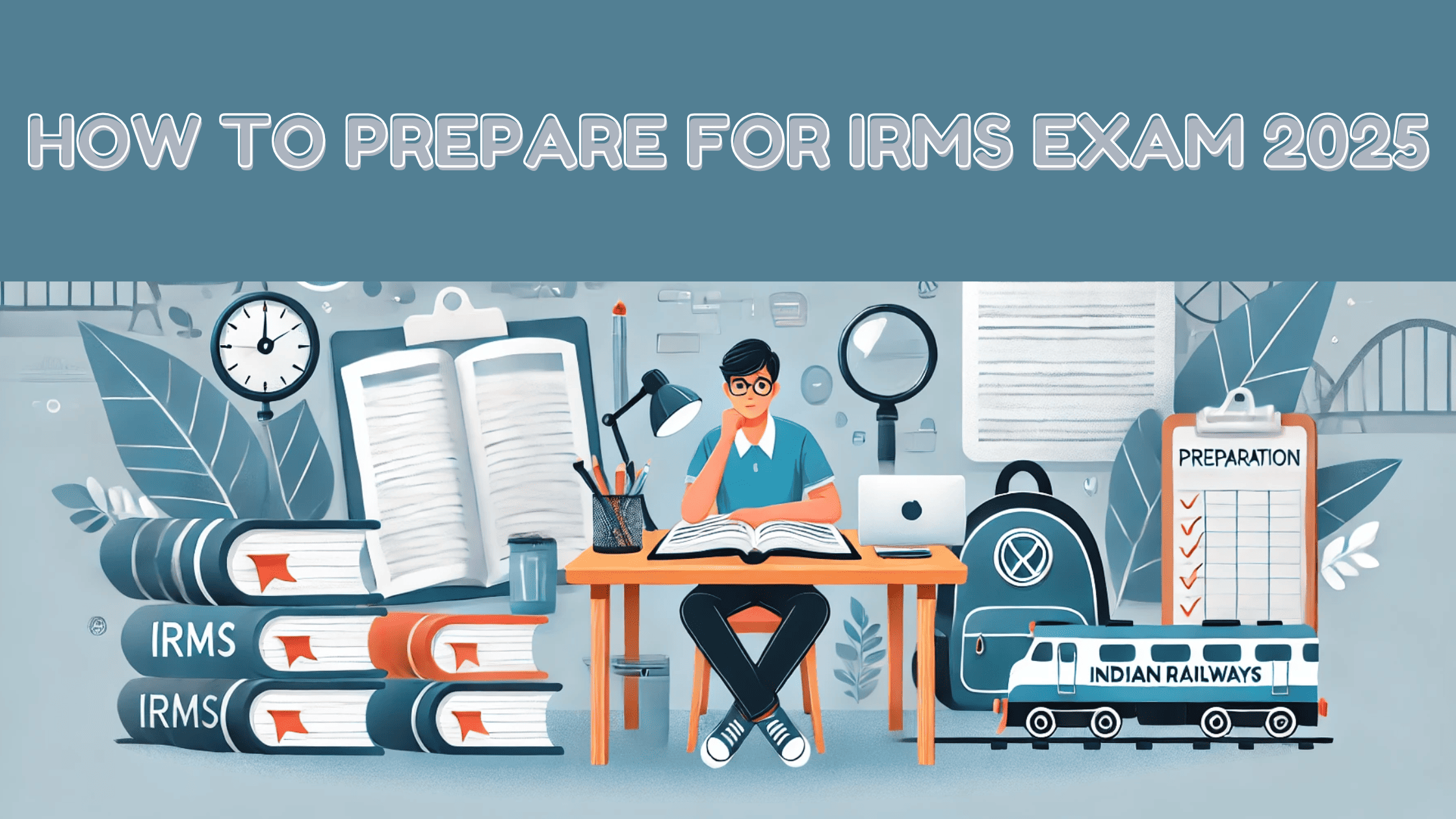How to Prepare for IRMS Exam 2025: The Indian Railways Management Services (IRMS) exam will be jointly conducted by the Union Public Service Commission to fill 225 managerial and technical positions in the Indian Railways in the disciplines of Civil, Mechanical, Electrical, S&T, and Stores. IRMS is a highly prestigious examination that offers a successful career path to aspirants within the government sector. The IRMS Exam 2025 tests the candidate’s knowledge in technical as well as non-technical sections.
The IRMS Exam 2025 will involve three stages i.e. prelims, mains and interview. Candidates are required to have well-structured strategies to prepare for the exam effectively. Discover the best tips for how to prepare for the IRMS exam 2025 in this article.
IRMS Exam Date 2025
IRMS exam presents a splendid opportunity for engineering graduates to excel in their careers in a specific discipline. The IRMS Prelims Exam 2025 will be conducted on June 8, 2025 and the Mains exam will take place on August 10, 2025. Those who perform well in both stages will be called for a personality test. In order to get success in the IRMS Exam 2025, candidates must follow the comprehensive preparation plan outlined below.
Understand the IRMS Syllabus & Exam Pattern
IRMS Exam Pattern
The IRMS exam involves three stages:
- Preliminary Examination (Prelims):
- A common exam conducted along with the UPSC Civil Services Prelims.
- Comprises two papers: General Studies (GS) and Civil Services Aptitude Test (CSAT).
- GS Paper: 100 questions, 200 marks.
- CSAT Paper: 80 questions, 200 marks (qualifying: 33% marks).
- Main Examination (Mains):
- A dedicated exam for IRMS candidates with technical and managerial components.
- Includes one paper on Engineering Disciplines/General Studies and another paper on Management/Technical Aptitude depending on the post applied for.
- Personality Test (Interview):
- Focuses on assessing the candidate’s personality, decision-making abilities, and suitability for managerial roles.
IRMS Syllabus
The syllabus is the cornerstone of your preparation. Divide it into manageable parts:
- Prelims Syllabus:
- GS Paper: History, Geography, Polity, Economics, Environment, Science & Technology, and Current Affairs.
- CSAT Paper: Comprehension, logical reasoning, numerical ability, and data interpretation.
- Mains Syllabus:
- Engineering disciplines (Civil, Mechanical, Electrical, Electronics, etc.).
- General Studies for managerial positions (Indian Economy, Railways’ role in development, Public Administration, etc.).
- Managerial Aptitude (Finance, Human Resource Management, Operations, and Marketing).
Develop a Strong Foundation
Begin your preparation by strengthening your basics:
- For technical subjects, refer to standard textbooks and previous academic material.
- For GS, use NCERT books for History, Geography, Polity, and Economy. These provide a concise yet comprehensive understanding of fundamental concepts.
Create a Study Plan
A well-structured timetable ensures disciplined and consistent preparation:
- Daily Targets: Allocate specific topics for each day.
- Weekly Reviews: Assess progress and revise regularly.
- Dedicated Time for Prelims & Mains: Divide your time to focus on Prelims first, followed by in-depth Mains preparation after qualifying.
Effective Time Management
- Dedicate 6-8 hours daily for preparation, ensuring breaks to avoid burnout.
- Spend equal time on technical and non-technical subjects initially, then shift focus based on strengths and weaknesses.
Focus on Prelims Preparation
The Preliminary stage is the first hurdle, and clearing it is mandatory to advance.
- For GS Paper:
- Regularly read newspapers like The Hindu or Indian Express for current affairs.
- Use magazines such as Yojana, Kurukshetra, and EPW for developmental issues.
- Refer to standard books like Laxmikant for Polity, Spectrum for Modern History, and Ramesh Singh for Economics.
- For CSAT:
- Practice comprehension and logical reasoning questions from resources like Arun Sharma’s Quantitative Aptitude.
- Solve previous year’s UPSC Prelims papers for CSAT.
Tackle Mains Preparation
The main exam requires a deeper understanding of the subjects.
- For Technical Papers:
- Use standard textbooks relevant to your engineering discipline (e.g., R.K. Rajput for Mechanical Engineering, S.K. Duggal for Civil Engineering).
- Solve previous year IRMS/ESE technical papers.
- For Managerial Topics:
- Study books on Operations Management, Financial Management, and Marketing by authors like Philip Kotler.
- Relate these concepts to railway-specific case studies.
Develop Answer-Writing Skills
Answer writing is crucial for the main exam.
- Practice writing crisp and structured answers under timed conditions.
- Incorporate diagrams, flowcharts, and bullet points where relevant.
- Take mock tests to simulate the real exam environment.
Prepare for the Interview
The interview assesses your personality, confidence, and managerial aptitude.
- Brush up on your technical subjects and current affairs.
- Be well-versed in Indian Railways’ structure, policies, and challenges.
- Practice mock interviews with experienced mentors or coaching institutes.
Subject-Wise Preparation Tips
Mastering the General Studies and Technical Subjects for the IRMS exam requires a strategic study approach and effective planning. Follow the tips suggested below to gear up your preparation:
General Studies
- History: Focus on modern history and the freedom struggle.
- Geography: Study physical, economic, and human geography.
- Polity: Understand the Constitution, governance issues, and recent amendments.
- Economy: Learn macroeconomic concepts and India’s fiscal policies.
- Environment: Cover biodiversity, climate change, and sustainable development topics.
- Current Affairs: Stay updated with relevant government schemes and international relations.
Technical Subjects
- Stick to the syllabus and avoid going beyond it.
- Solve previous years’ ESE/GATE papers for practice.
- Focus on core topics like Thermodynamics (Mechanical), Circuits (Electrical), and Structural Analysis (Civil).
Role of Mock Tests and Previous Year Papers
- Attempting mock tests builds confidence and improves speed.
- Analyze mistakes to fine-tune your strategy.
- Solve at least 5-10 years’ worth of previous IRMS-related papers to understand the pattern.
The IRMS exam requires a blend of technical expertise, managerial skills, and general knowledge. With systematic preparation, disciplined execution, and consistent revision, aspirants can maximize their chances of success in this prestigious examination. Stay focused, adapt your strategies as needed, and be consistent with preparation to unlock your success.
Ans. The IRMS (Indian Railway Management Service) exam is a prestigious recruitment exam conducted by the Union Public Service Commission (UPSC) for managerial and technical roles in the Indian Railways. It integrates various railway services under a single unified cadre. Ans. The IRMS 2025 prelims exam is scheduled to be conducted on June 8, 2025 and Mains exam will be organized on August 10, 2025. Ans. Yes, mock tests improve time management, speed and accuracy, and familiarity with the exam pattern. Mock test helps to enhance your performance to identify and rectify weaker areas. Ans. Yes, with disciplined time management and systematic approach will help to prepare for IRMS along with a job. Allocate 3 to 4 hours daily for study and intensify your preparation during weekends or leave periods.How to Prepare for IRMS Exam 2025 FAQs
Q. What is the IRMS exam?
Q. When will the IRMS 2025 exam be held?
Q. Is solving mock tests beneficial for IRMS preparation?
Q. Can I prepare for IRMS exam with a job?

